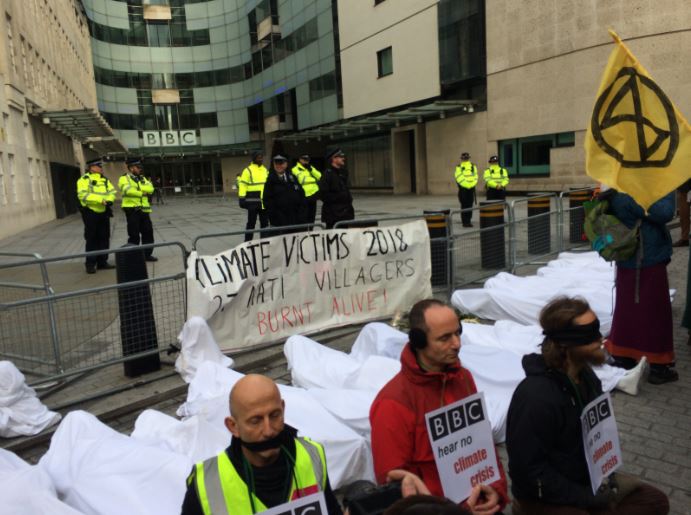Over the course of 2018, I was deeply moved to discover the following verdict on the fate of our food supplies: “The current data on temperature rise at the poles and impacts on weather patterns around the world suggests we are already in the midst of dramatic changes that will impact massively and negatively on agriculture within the next 20 years,” said professor of sustainability, Jem Bendell, in a recent talk. Modern society – which depends on reliable agriculture – is therefore almost certain to collapse, unless we make radical adaptations. Bendell’s best guess is collapse will happen within the next 10 years.
I decided to channel my alarm into joining the peaceful uprising that’s sweeping across the world – Extinction Rebellion. So in December, I was at the Rebellion’s big day of action against the BBC, where we forced Broadcasting House into lockdown. It was remarkable ambience – Abba singing, a huge inflatable dinosaur, and a bearded man dressed as ‘Sustainaclaus’. But on a more sombre note, we were demanding the BBC tells the truth about runaway climate change. A threat which could cause a death toll even greater than World War II.
“This is the biggest cover up in British history,” campaigner Jonathan Fuller lamented during his rousing speech.

But how are we going to achieve the controversial policies needed to save life on earth? At Extinction Rebellion, we believe the answer is a Citizens’ Assembly. A tried and tested method of democracy that harks back to Ancient Athens. The idea is citizens are randomly selected to represent the wider public, similar to a legal jury. The citizens hear evidence from experts, and then discuss around tables before coming to a decision.
It’s needed because existential issues like climate breakdown go beyond the short-termism of our current electoral cycle. Most politicians also stay clear of emergency climate responses for fear of being kicked out. Look to France for example – in recent weeks the ‘Gilets Jaunes’ movement revived the spirit of 1789 with rioting (sometimes violent) against President Macron’s eco-tax on fuel. So imagine the backlash from a big carbon tax wacked on high-emission foods like, le steak haché. Even in England I wouldn’t be surprised if the pitchforks were out over a 30p tax on a Cornish pasty.
A citizens’ assembly, on the other hand, means that ordinary people like you and me would have a say on how net zero carbon is achieved. The citizens can say – “hey, what about the impact for people living on the breadline?” Here the citizens can call for additional evidence, like about how adverse social impacts can be mitigated.
One example of this might be to return the revenues from carbon taxes to our all pockets, (instead of Treasury coffers), meaning that many citizens would pay less tax overall. What about the people who’d lose out? Well, the beauty of a citizens’ assembly is that diehard vegans can listen and debate with bacon lovers to eventually reach a compromise policy.
So, that’s climate change and democracy all sorted then. Next stop, Brexit?















0 Comments